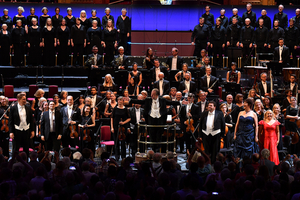Review: PROM 43: BEETHOVEN'S NINTH SYMPHONY, Royal Albert Hall

![]() You may not have realised it at the time, but at some point or other in your life there's a strong chance you will have heard some of Beethoven's Ninth Symphony in D minor. Whether it was thanks to Alex's love of a bit of "Ludwig van" in A Clockwork Orange or through the affiliation of "Ode to Joy" to the European Union, it has cropped up a lot in the almost three hundred years it has existed.
You may not have realised it at the time, but at some point or other in your life there's a strong chance you will have heard some of Beethoven's Ninth Symphony in D minor. Whether it was thanks to Alex's love of a bit of "Ludwig van" in A Clockwork Orange or through the affiliation of "Ode to Joy" to the European Union, it has cropped up a lot in the almost three hundred years it has existed.
It was no surprise, then, that the Royal Albert Hall was packed to the rafters for its performance at this year's Proms; it has been part of the programme nearly every year, this time at the hands of the BBC Symphony Orchestra - and the voices of the BBC Symphony Chorus.
The evening wasn't all about Beethoven, however, as the first half of the concert saw two world premières: Jonathan Dove's We Are One Fire (a BBC commission) and Dieter Ammann's Piano Concerto, Gran Toccata (a BBC co-commission).
Dove's composition is a purely choral piece, with Neil Ferris stepping out to conduct the chorus for its performance. It was an interesting start to the evening, with Alasdair Middleton's words leaping from the page and the different sections of the chorus almost competing with each other at times. Purely from a musical perspective, I feel as though it would have been stronger had the words not been in English - it had quite a Germanic feel to it, and playing up to that could have had a powerful effect on the audience.
The next piece of the evening, Ammann's Piano Concerto, was a definite crowd-splitter. Written for the soloist, Andreas Haefliger, it begins in a quite simple fashion with the piano - after this, the rest of the orchestra joins in bit by bit, often using their instruments in slightly unexpected ways to create different sounds. I'm not against less conventional pieces of classical music, by any means, however this one refuses to allow you to get any kind of a handle on it.
Gran Toccata has the feel of a film or television soundtrack with some Foley art added in, although oddly it didn't manage to conjure up any images in my mind. It's also a bit too long for something that doesn't seem to have any obvious structure or flow. There was some incredible musicianship on display - particularly from Haefliger at the piano - and credit should definitely go to conductor Sakari Oramo for his exceptional oversight.
Simply put, this concerto felt terribly out of place on the evening's programme; We Are One Fire did at least consider the thought about "shared ancestry" that's prominent in the words of "Ode to Joy" when putting the text together, and the fact that it's a choral piece is a more obvious link to the Ninth Symphony. Gran Toccata, meanwhile, is leagues away from the style and theatre of Beethoven, and might have had a more fitting première on a different programme.
The main event, however, was very much worth the wait. Soloists Anu Komsi (soprano), Hilary Summers (contralto), Michael Weinius (tenor) and Mika Kares (bass) joined the BBC Symphony Orchestra and Chorus in a masterful display of unity and musical ability.
Beethoven's Ninth comes in at around 70 minutes, but the time flew by with each movement; the whole symphony is full of drama, but also a surprising amount of playfulness in certain sections - the flair and energy with which Oramo conducted the piece reflected this quite marvellously. As thrilling as each movement was, it's the choral finale that really captured everyone's imagination - "Ode to Joy" is now known best as the anthem for the European Union, with nearly all of the text being Schiller's poem of the same name (Beethoven himself wrote a few lines to introduce the final part of his composition).
That famous theme ringing out around the Royal Albert Hall was enough to make the hairs on the back of your neck stand on end, and fully deserved its standing ovation. It was a rousing end to an intriguing evening - another Proms moment that will live long in the memory.
The BBC Proms are at the Royal Albert Hall until 14 September
Picture credit: BBC/Chris Christodoulou
Videos

